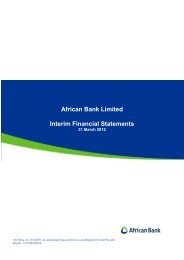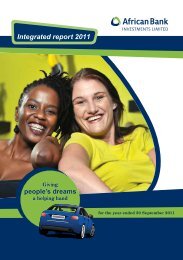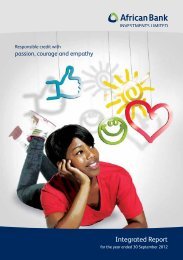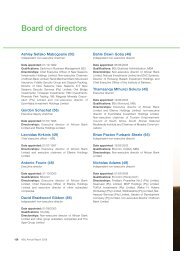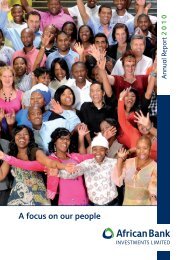Download - African Bank
Download - African Bank
Download - African Bank
You also want an ePaper? Increase the reach of your titles
YUMPU automatically turns print PDFs into web optimized ePapers that Google loves.
Management discussion<br />
Overview<br />
Key features of this set of results include:<br />
Headline earnings increased to<br />
R680,1 million<br />
<strong>African</strong> <strong>Bank</strong>’s credit rating upgraded<br />
to zaA- (long-term) and zaA1<br />
(short-term)<br />
A R1,0 billion ABL2-bond raised by<br />
<strong>African</strong> <strong>Bank</strong><br />
Group capital adequacy increased<br />
from 38,1% to 44,5%<br />
Costs (excluding the Saambou PLB)<br />
lower than in 2002<br />
Return of R863 million to<br />
shareholders through:<br />
– An ordinary dividend of 56 cents<br />
declared for the year, 86,7%<br />
higher than the 30 cents per share<br />
paid in 2002<br />
– A special dividend of 100 cents<br />
per share declared<br />
– A R124 million share buy-back at<br />
595 cents per share (ex dividend)<br />
in May 2003.<br />
Financial summary<br />
Headline earnings for the year ended<br />
30 September 2003 increased to<br />
140,4 cents per share (2002: 104,4 cents)<br />
or to R680,1 million (2002: R510,6<br />
million).<br />
ABIL distinguishes between books on<br />
which lending takes place (“lending<br />
books”), and books that are merely<br />
collected and on which no new advances<br />
take place (“paydown books”).<br />
The performance for the group during<br />
the 12-month period for 2003 was mainly<br />
influenced by:<br />
a 14,5% increase in interest income<br />
on advances, as a result of the<br />
contribution from the Saambou PLB<br />
book, the lending books that grew by<br />
12,5% on the back of a 15,4% growth<br />
in sales volumes and risk-adjusted<br />
yields that improved to 44,7% (2002:<br />
38,4%). The latter was aided by a<br />
changing mix in the portfolio to<br />
higher margin retail debit order<br />
business and lower charges for bad<br />
debts as the effects of the credit<br />
bubble started to diminish;<br />
a 4,5% increase in the net financing<br />
costs, as interest-bearing liabilities<br />
and the cost thereof increased over<br />
the period. This was partially offset<br />
by the building up of significant<br />
cash balances. Average cash for<br />
the year was R1,2 billion (2002:<br />
R806 million);<br />
costs that have been contained, with<br />
year-on-year costs lower than in 2002<br />
excluding the acquired Saambou<br />
PLB costs; and<br />
secondary tax on companies (STC)<br />
increasing to R33 million as a result<br />
of increased dividend payments.<br />
Looking ahead<br />
Sales on the lending books are<br />
expected to remain robust and should<br />
largely compensate for the decline in the<br />
paydown books over the coming year.<br />
Gross yields are expected to continue to<br />
increase as lower yielding paydown<br />
books are replaced with higher yielding<br />
debit order business. Bad debt charges<br />
to the income statement should remain<br />
steady at current levels and ABIL will<br />
continue to focus on reducing its<br />
operating costs. The outlook for both<br />
return on assets and return on equity<br />
is positive.<br />
Investors should note that the special<br />
dividend of 100 cents per share will<br />
attract R60,5 million of STC, which<br />
will likely be accounted for as a<br />
tax charge in the 2004 year. This will<br />
reduce potential earnings per share<br />
by 12,5 cents for the six months to<br />
31 March 2004.<br />
The challenges and focus areas for the<br />
coming year will be:<br />
continued refining of credit<br />
underwriting with specific emphasis<br />
on the further development of<br />
behavioural scorecards to better<br />
differentiate the pricing to our<br />
clients;<br />
enhanced collection processes and<br />
progress on the rehabilitation of<br />
clients in financial distress;<br />
further cost reductions in both<br />
<strong>African</strong> <strong>Bank</strong> Retail and Specialised<br />
Lending;<br />
the harmonising of governance<br />
structures across the group;<br />
further progress in the employment<br />
equity objectives at executive and<br />
senior management levels;<br />
exploring new products and markets<br />
under the leadership of a dedicated<br />
innovation unit; and<br />
the integration of sustainability<br />
objectives and targets across the<br />
group.<br />
19<br />
<strong>African</strong> <strong>Bank</strong> Investments Limited



